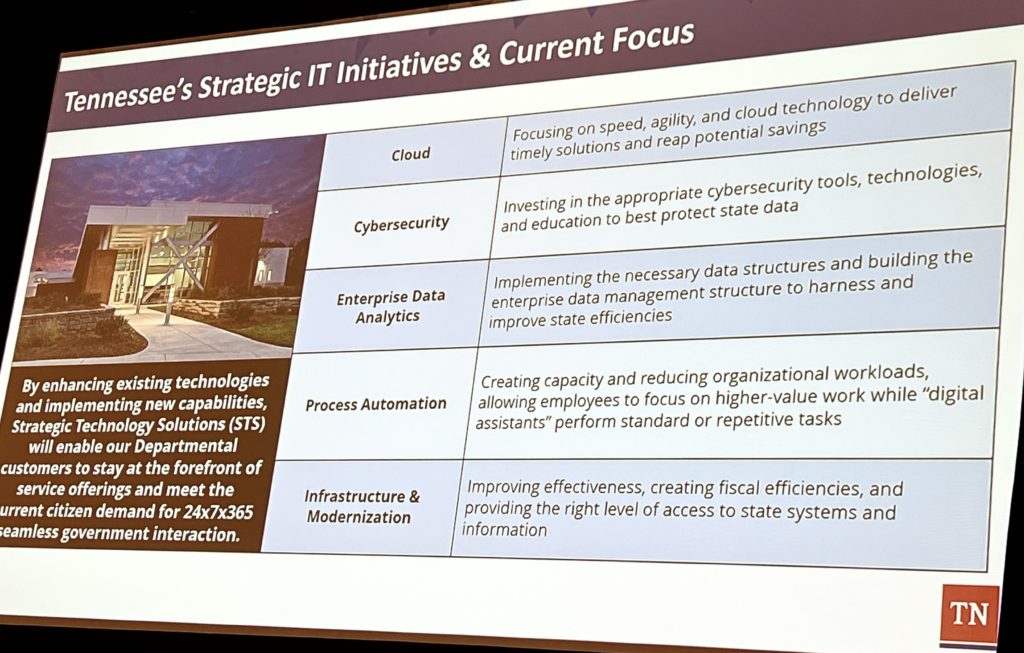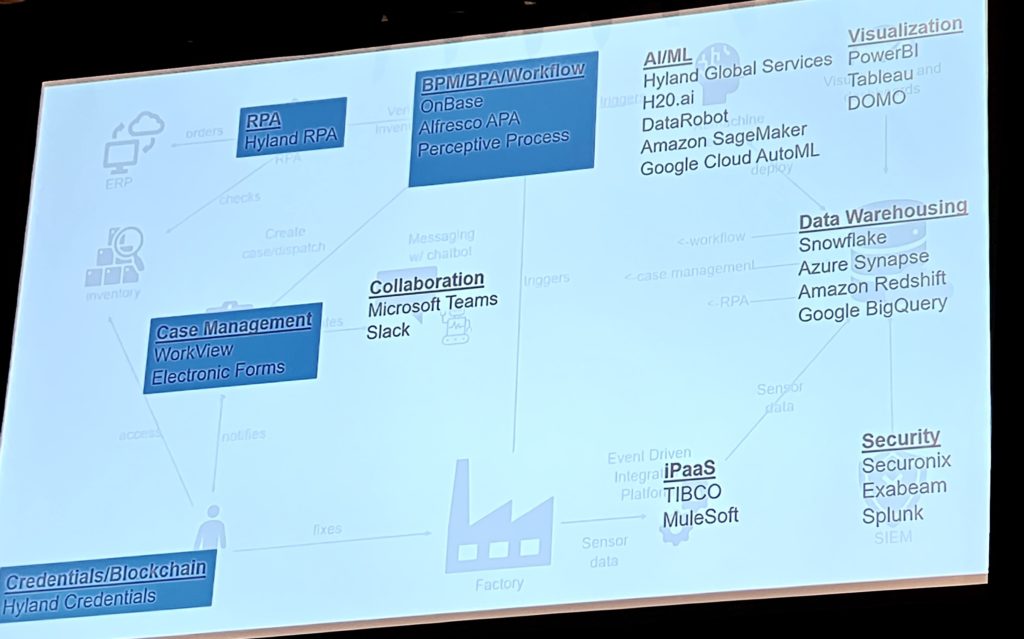It’s been a long 2.5 years since I was last at a conference in person, and I’m kicking off the new era with Hyland’s CommunityLIVE in Nashville. I came in early to attend today’s Executive Forum, where we were welcomed by Stephanie Dedmon, CIO of the state of Tennessee. She gave us a brief view of their IT initiatives, one of which is process automation (specifically RPA). I will be giving a presentation tomorrow about some of the best practices around intelligent automation, and one of those is having process automation right on your strategic initiatives list, like what Dedmon tells us is the case with the local state government.

We had a corporate update from Hyland’s CEO, Bill Priemer. I haven’t been to a Hyland event before — I came to this from my past relationship with Alfresco prior to their acquisition by Hyland — and it’s good to see a more complete briefing including how their recent acquisitions are being handled. He covered some financials and other numbers that I have not included here since I usually just focus on the technology, and I’m not sure if I’m cleared to discuss those outside this venue.
Priemer said that they are “solely focused on content services”, which does not sound all that great for the process side of the former Alfresco product; recall that the absorption of Activiti into Alfresco which turned it into essentially (just) a content-centric process engine was controversial, and led to the departure of some of the original Activiti architects and developers. I expect that many Activiti customers/users that were not doing content-centric projects have already migrated to other platforms that came from the same core code base, such as Camunda and Flowable.
Their corporate priorities around product development are focused on developing their next-gen SaaS experience platform, and building a cloud core engine to migrate existing customers. I’m a bit surprised that they’re this far behind the curve on cloud technology, but they have a pretty significant on-premise customer base for their legacy OnBase product. Having acquired Perceptive (2017) and Nuxeo (2021) in addition to Alfresco (2020), they are also still busy digesting those: supporting (and advancing) each of them as separate products, while planning out a product roadmap for convergence. Interestingly, they have committed to their current 80% remote workforce (which used to be 80% in the office), and are likely learning to “eat their own dog food” and therefore coming to a full understanding of what their customers are facing as they move to cloud platforms to support remote work. If nothing else, they could become their own best testbed for cloud.
There was a panel hosted by Ed McQuiston, Chief Commercial 1Officer (which includes sales, marketing, customer success and a few other things); panels are difficult to capture in a post like this, but there was an interesting bit of the discussion on how automation is becoming paramount: costs are being cut after a couple of years of “drunken sailor” spending just to stay in business, and if you don’t start automating, you’re going to be in trouble. The easy stuff needs to get automated, to leave the hard stuff for the staff remaining after the Great Resignation. In my presentation tomorrow, I’m going to be talking about the “automation imperative” which expands these ideas a bit more.
I stepped out while they did some roundtable sessions, then returned at the end of the afternoon for the product update with Hyland’s Chief Product Officer, John Phelan. He will be covering some of this same territory in the general keynote tomorrow morning, but I’ve grabbed what I could from this session and can fill in some of the blanks tomorrow. He spoke quite a bit about platform extensibility, allowing many other types of capabilities to plug into Hyland’s content services core. Or rather, cores, since this could be any of their (competing) content services engines. I’m looking forward to hearing more about the roadmap for convergence of the engines; with content engines, this is an tough one because full platform convergence requires a migration pathway — at a reasonable cost — for clients. He showed a slide with different use cases for platform extensibility, being able to plug in RPA, or records management, or intelligent capture, or case management. But not mentioned (obvious to my process-centric ears) was process management, a capability that they now have in the Activiti/Process Services that came with the Alfresco acquisition. Even if they call it workflow, a term that most people in process management feel is a bit too simplistic, it still was missing from his slide. Case management and process management are highly related, but not the same thing, unless you’re going to restrict your process management to case management paradigms in order to have process exist only as an adjunct to content. RPA is, of course, task automation, not process management. I’m seeing a bit of a gap in the strategy, or maybe it’s a terminology issue; I’d like to see a more detailed briefing of the whole platform to gain a better understanding.
Phelan was followed by Hyland’s Chief Innovayion Officer, Sam Babic, who gave a bit of a review of Gartner’s definition of hyperautomation (a term that still makes me giggle a bit in spite of having written a paper on the topic recently). Every vendor has their spin on hyperautomation, and Babic spoke about some of the practical aspects of how to implement solutions in a hyperautomation fashion: leveraging multiple leading-edge technologies (IoT, event-driven architecture, AI/ML, RPA, chatbots, etc.) to be able to swiftly create new business solutions. He does include workflow as a (I believe) headless orchestration of triggers that can then instantiate a case, so that’s something, and included the phrase BPM/BPA/Workflow on his product capability word salad slide. Obviously, they have a very content-centric view of the product space, whereas I’m a column 2 kind of girl.

I’ll be presenting tomorrow afternoon in the Business Transformation track — in the least desirable time spot at the end of the day, where I’m contractually obligated to tell the attendees that I’m the only thing standing between them and the bar — with on the topic of maximizing success in automation projects. I’ve spent 30+ years building automation software (content and process) and building solutions using that same type of software, so have seen a lot of things go wrong, and some things go right. If you’re here at CommunityLIVE, stop by to hear about my best practices, plus a few anti-patterns to watch out for.

